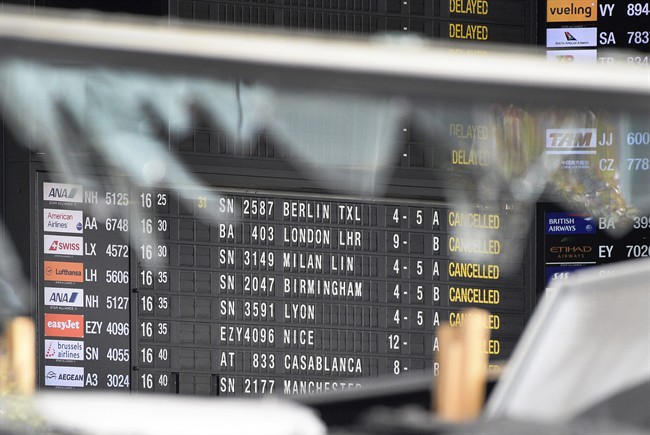LONDON – Financial markets barely registered this week’s attacks in Brussels, which killed more than 30 people, a sign that investors think the economic impact on Belgium and across Europe as a whole will be limited. Recent history suggests they may be right.

The experience of terror attacks in Europe in the past decade have helped the business community keep their cool in the face of horrors like this week’s deadly bombings at the Brussels airport and subway.
Firms have gotten better in their responses. From identifying personnel, to clearing offices or sanctioning remote working, even at recovery sites, they manage to contain the disruption. The people have shown a willingness to get back to life as usual as soon as they can, whether it be shopping, boarding a train or having a meal. And governments learn to put in place security measures they hope will deter more attacks.
“While these events remain rare, they’re now sadly frequent enough for markets to have plenty of experience in how business and society reacts — and almost always they’ve proven to be resilient, so the fears of prolonged disruption to the key areas of the economy have faded,” said David Lea, senior Europe analyst at Control Risks, an international consultancy that advises firms on how to manage risks.
READ MORE: Bombers may have rushed Brussels attacks as police closed in: Officials
That realization has become apparent in the reaction in financial markets. Whereas markets were volatile after mass-casualty bombings in Madrid in 2004 and London in 2005, they were not jolted much by the two attacks in Paris last year. That may be partly due to digital media, which helps traders understand more quickly the scale of an attack, but also the understanding that daily life resumes relatively quickly.
“Individual terror attacks usually do not change underlying economic trends,” said Holger Schmieding, an economist at Berenberg Bank. “That at least was the clear lesson of the terror attacks on Madrid and London in 2004 and 2005.”

Get breaking National news
While Belgium has seen an increase in home-grown Islamic extremists over the past few years, it has not seen attacks on Tuesday’s scale. It’s on a sharp learning curve, certainly in comparison with the likes of France which has faced various terrorist threats over the years, including Algerian nationalists in the 1950s and 1960s, and Britain, which endured decades of attacks from Irish republicans.
A lot of the functions — such as the metro and suburban rail services — that were suspended last November when Brussels was in lockdown for a few days after the Paris attacks that killed 130 people, are returning to normal, an indication that the city is learning from its own experiences.
READ MORE: Brussels attacks: Mother of twin 3-year-old girls named as victim
“They are gradually acclimatizing to it,” said Control Risks’ Lea.
Belgium’s main stock index ended Tuesday more or less flat on the day and rose 0.2 per cent on Wednesday, a testament to the investment community’s level-headedness.
Yet it would be wrong to suggest that the Belgian economy won’t face any short-term economic fallout from the attacks. Consumer spending, particularly in the capital, will likely take a hit as will tourism ahead of the long Easter weekend. Belgian cities, such as Bruges and Brussels, traditionally sees tourist numbers rise at this time of year as many Europeans seek out a city break.
If the early evidence of the Paris attacks of Nov. 13, 2015 is anything to go by, the economic impact on Belgium won’t be too dramatic. Economic consultancy IHS Global Insight expects the bombings to shave 0.1 percentage point off Belgium’s quarterly economic growth, in line with the reduction in French GDP in the fourth quarter of 2015 after the attacks in Paris. With Belgium accounting for about 4 per cent of the eurozone, that would not have a significant impact on the region overall.
READ MORE: After Brussels tragedy, terror attacks are the ‘new normal’ for Europe
“French household confidence proved more resilient than anticipated, with consumers not prepared to change their daily habits in the face of terrorist attacks,” said IHS Global Insight economist Francesca Peck. “We expect Belgian consumers to show similar resilience, and anticipate a limited impact on both sentiment and spending intentions in the next few quarters.”
Sustained terrorist attacks from the likes of the so-called Islamic State have been identified by many as one of the main risks confronting the European economy, alongside, among others, worries over the future of the euro currency, cybercrime and climate change.
The economic impact would become more significant if the incidence of attacks increases, as they have recently in Turkey, which could put a more lasting dampener on a range of economic activities, from tourism to recreation and conference-hosting.
“If the purpose of terrorism is intimidation then market indifference would seem the most appropriate way for them to respond in order to show solidarity with the victims,” said Simon Derrick, senior market strategist at BNY Mellon. “Nevertheless, it is worth asking whether there may be a cumulative effect on investor sentiment from the continued terrorist assaults in western Europe, Turkey and Lebanon. We will continue to monitor this issue closely.”






Comments